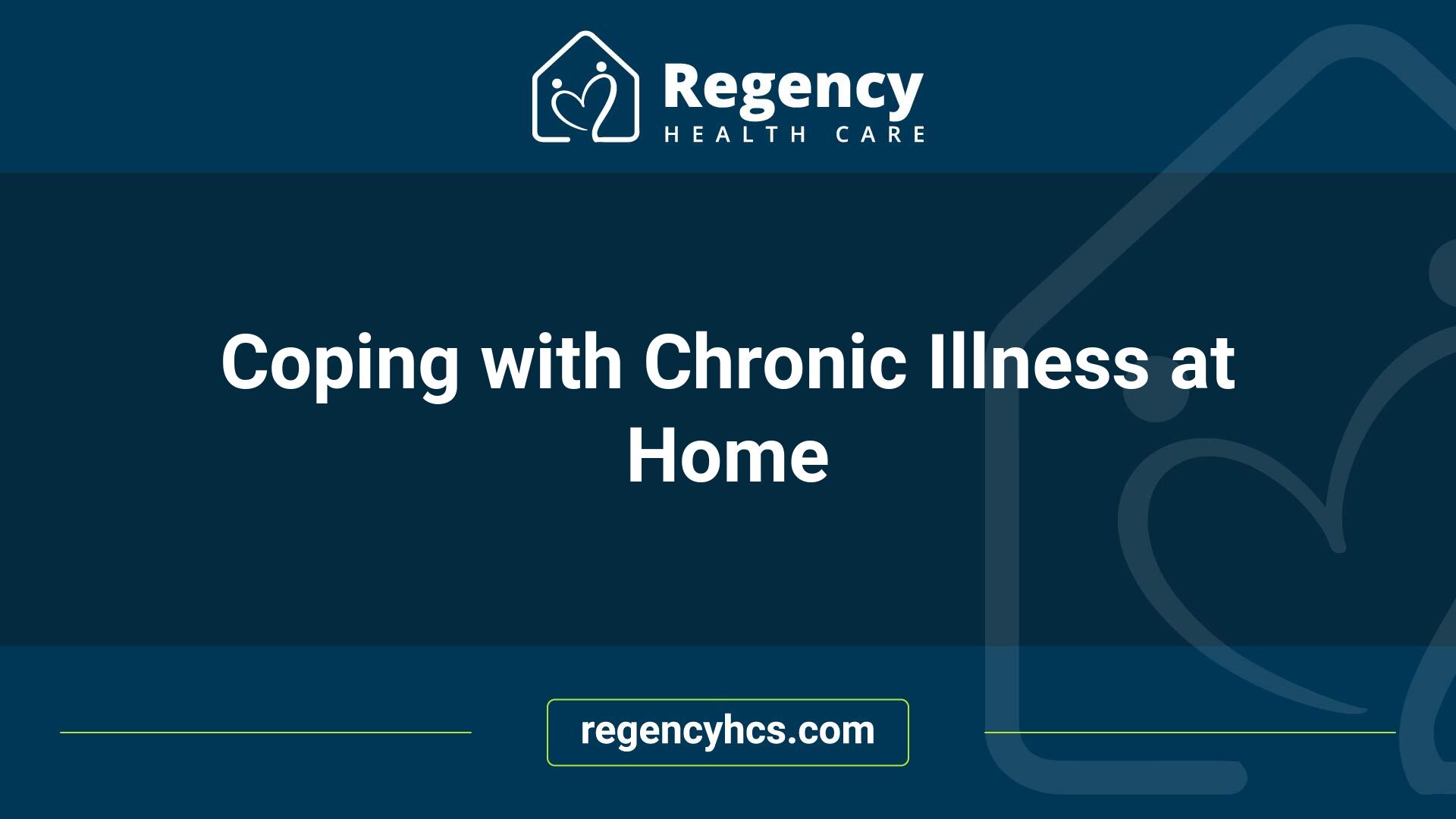Coping with Chronic Illness
Navigating through the challenges of coping with chronic illness at home requires a deep understanding of the signs of decreased coping ability, the impact on daily activities, and the emotional and psychological effects that individuals may experience.

Signs of Decreased Coping Ability
Recognizing the signs of decreased coping ability is crucial for early intervention and support. Symptoms such as disturbed sleep, body aches, anxiety, and irritability can serve as red flags signaling that an individual may be struggling to cope with their chronic illness [1]. Seeking help early from an individual counselor or a support group is recommended to manage stress, pain, and fatigue related to chronic illness.
Impact on Daily Activities
Chronic illness can significantly impact an individual's daily activities. Visible symptoms like pain, fatigue, and mood disorders can disrupt routine tasks and responsibilities. Managing health-related activities and treatments can introduce stress and anxiety, further complicating daily life. The need to constantly monitor and address health issues can consume time and energy, affecting one's ability to engage in everyday activities and hobbies.
Emotional and Psychological Effects
Coping with chronic illness goes beyond the physical symptoms; it also entails managing the emotional and psychological toll it takes. The continuous stress of dealing with a chronic condition can lead to feelings of frustration, anger, hopelessness, and even depression. These emotional challenges not only affect the individual but also have repercussions on their family members and support network. It is essential to seek help early to address these mental health concerns and alleviate the burden of chronic illness [1].
Understanding the signs of decreased coping ability, the impact on daily activities, and the emotional and psychological effects of chronic illness is foundational in developing coping strategies and seeking appropriate support. By acknowledging and addressing these facets, individuals can better manage the complexities of living with a chronic condition and work towards improving their overall well-being and quality of life.
Challenges in Work and Finance
Navigating the impact of chronic illness on work and financial stability can bring about significant challenges for individuals. Chronic conditions can disrupt work routines and lead to financial difficulties, affecting both the individual's professional life and overall financial well-being.
Changes in Work Routines
Chronic illness can significantly impact one's ability to maintain regular work routines. This can manifest as physical limitations, increased fatigue, and other symptoms that hinder productivity. Homemakers, for instance, may find it challenging to balance household responsibilities with their health needs, resulting in a slower completion of tasks and potential anxiety about the future. As outlined by the Cleveland Clinic, chronic conditions can necessitate adjustments in work schedules, accommodations in the workplace, and may even lead to a reduced workload or temporary leave of absence.
Financial Difficulties
The financial implications of chronic illness can be profound. In the United States, approximately 60% of adults live with a chronic condition, with 40% managing two or more chronic conditions [2]. These conditions often require ongoing medical care, medications, and lifestyle modifications, all of which can incur significant costs.
For working individuals impacted by chronic illness, reduced work hours or the inability to work can result in a loss of income and financial strain. This can create challenges in meeting daily expenses, accessing necessary healthcare services, and maintaining quality of life. It may also lead to long-term financial instability and difficulties in planning for the future.
Caregivers supporting individuals with chronic illnesses may also face financial burdens, especially if their caregiving responsibilities impact their ability to work or pursue other income-generating activities. The additional costs associated with caregiving, such as medical expenses, respite care, and adaptations to the home environment, can further exacerbate financial challenges.
Overall, managing the changes in work routines and facing financial difficulties due to chronic illness requires individuals and caregivers to seek support, explore financial resources, and proactively address the economic impact of long-term health conditions. Remaining informed about available assistance programs, insurance coverage, and financial planning options can help alleviate some of the stress associated with the financial aspects of coping with chronic illness at home.
Seeking Professional Help
Dealing with a chronic illness at home can be emotionally and mentally taxing. Seeking professional help is a crucial step in managing the challenges that come with chronic conditions. Two valuable resources are individual counseling and support groups.
Individual Counseling
Individual counseling provides a safe and confidential space to express your thoughts and emotions surrounding your chronic illness. Trained therapists or counselors can offer guidance on coping strategies, stress management techniques, and ways to improve your overall well-being. According to the National Institute of Mental Health, individual counseling can help individuals navigate the emotional complexities that arise from living with a chronic condition.
Counseling sessions can focus on building resilience, improving self-esteem, and addressing any mental health concerns that may arise as a result of chronic illness. By working with a professional counselor, individuals can develop coping mechanisms to better manage the psychological impact of their condition.
Support Groups
Joining a support group can provide a sense of community and understanding that is invaluable when coping with a chronic illness. Interacting with others who are going through similar experiences can foster a sense of belonging and reduce feelings of isolation. Support groups offer a platform to share your challenges, exchange practical tips, and receive emotional support from peers in similar situations.
Through shared experiences and mutual encouragement, support groups can help individuals feel less alone in their journey with chronic illness. Support groups can be both in-person or online, allowing individuals to connect with others regardless of their physical location.
If you are considering seeking professional help, resources like Ultimate Care NY can offer guidance on finding the right support for your needs. Additionally, Talkspace provides online counseling services that can be convenient for individuals managing chronic conditions from home.
By engaging in individual counseling and participating in support groups, individuals can access the emotional support and coping strategies needed to navigate the challenges of living with a chronic illness at home. Collaborating with professionals and peers can empower individuals to enhance their quality of life and mental well-being while managing the complexities of their health condition.
Managing Physical Changes
Living with a chronic illness can bring about physical changes that go beyond the symptoms of the condition itself. These alterations can significantly impact an individual's self-image and social interactions, leading to potential social withdrawal.
Impact on Self-Image
Chronic illness can lead to changes in appearance, causing individuals to perceive themselves differently. Physical alterations, such as weight fluctuations, skin changes, or visible signs of the illness, can affect self-esteem and body image. Coping with these changes and maintaining a positive self-image may require adjustments in self-care routines, emotional support, and possibly professional guidance.
It's essential for individuals facing these challenges to remember that self-image is not solely based on physical appearance. Seeking support from healthcare providers, counselors, or support groups can aid in addressing concerns related to self-image and promote self-acceptance despite physical changes.
Social Withdrawal
As chronic illness impacts self-image and daily functioning, individuals may experience feelings of self-consciousness or embarrassment, leading to social withdrawal. The fear of judgment or the physical limitations imposed by the illness can hinder social interactions and participation in activities they once enjoyed. This withdrawal can lead to feelings of loneliness, isolation, and even exacerbate emotional distress.
To mitigate social withdrawal, fostering open communication with trusted friends and family members is crucial. Explaining the challenges faced due to the illness can help others understand and provide the necessary support. Additionally, engaging in activities that promote self-confidence and self-expression, such as hobbies or virtual social gatherings, can help individuals maintain social connections and combat feelings of isolation.
By recognizing the impact of chronic illness on self-image and social interactions, individuals can take proactive steps to address these challenges and maintain a positive outlook on their journey towards managing the illness at home. Remember, seeking individual counseling or participating in support groups can offer valuable resources for navigating these emotional and social aspects of living with a chronic condition.
Role of Caregivers
When it comes to the role of home health aides in coping with chronic illness at home, caregivers play a crucial role in providing both practical assistance and emotional support to individuals navigating the challenges of chronic conditions. This section will delve into the two significant aspects of the caregiver's role – supporting tasks and chores, and emotional and physical support.
Supporting Tasks and Chores
Caregivers, whether professionally trained or family members, play a vital role in assisting individuals with chronic illnesses in managing daily tasks and chores to ensure a healthy and fulfilling life at home. According to (LinkedIn), caregivers help individuals maintain social connections, engage in hobbies, and find satisfaction in daily activities. By providing practical support with tasks like meal preparation, medication management, and personal care, caregivers can significantly improve the quality of life for those with chronic illnesses.
Moreover, caregivers can offer valuable assistance in creating a safe and supportive home environment that caters to the specific needs of individuals with chronic illnesses. This may involve making modifications to the living space to enhance accessibility and reduce the risk of accidents or injuries. By addressing these practical concerns, caregivers contribute to creating a comfortable and enabling environment for individuals to manage their health effectively at home.
Emotional and Physical Support
In addition to assisting with daily tasks, caregivers play a vital role in offering emotional and physical support to individuals coping with chronic illnesses. Family caregivers, in particular, often experience challenges in providing care due to feeling unprepared and lacking adequate knowledge and guidance from formal healthcare providers [3]. This can lead to neglect of their own health needs, impacting their well-being over time.
Caregivers provide a reassuring presence and emotional support to individuals facing the physical and emotional toll of chronic illnesses. They offer companionship, empathy, and a listening ear, helping individuals navigate the complex emotions and challenges that come with managing a chronic condition. Additionally, caregivers can provide physical assistance, such as mobility support, transportation to medical appointments, and assistance with personal care tasks, to ensure the comfort and well-being of the individual under their care.
By shouldering the responsibilities of supporting tasks and chores, as well as offering emotional and physical support, caregivers play a pivotal role in enhancing the quality of life and well-being of individuals with chronic illnesses. Their dedication and compassion contribute significantly to the holistic care and management of chronic conditions within the home environment, fostering a sense of security, dignity, and independence for those they care for.
Caregiver Challenges
Caring for individuals with chronic illnesses at home brings about unique challenges for caregivers, impacting both their health and well-being. Understanding these challenges is essential to provide adequate support for those caring for their loved ones.
Health Risks for Caregivers
Recent surveys estimate that there are 44 million caregivers over the age of 18 years in the United States, with most of them handling time-consuming and physically demanding tasks like personal care. Men represent at least 40% of caregivers, showcasing a significant increase in male caregivers over the years.
Statistics reveal that on average, informal caregivers devote 4.3 years to caregiving, with many spending significant amounts of time, sometimes more than a decade, providing care to their family members. More than half of family caregivers dedicate at least 8 hours per week to caregiving, with a significant portion providing over 40 hours per week.
The physical toll of caregiving is alarming, with reports of declines in physical health and premature death among caregivers, particularly elderly spouses who face a 63% higher mortality rate when under stressful caregiving demands. Caregiver burden and strain have been linked to the caregiver's own poor health status, increased health-risk behaviors, and higher use of prescription drugs. Caregivers are at risk for various health issues such as fatigue, sleep disturbances, altered immune functioning, increased insulin levels, blood pressure, and higher risks for cardiovascular disease [3].
Impact on Caregiver Well-Being
Caregivers who perceive themselves as burdened are more likely to experience declines in health, engage in health-risk behaviors, and report higher use of prescription drugs. The stress and strain of caregiving can lead to fatigue, sleep disturbances, altered immune functioning, increased insulin levels, blood pressure, and higher risks for cardiovascular disease.
Furthermore, family caregivers often feel unprepared and under-knowledgeable to deliver proper care due to the lack of support and guidance from formal health care providers. This deficiency in support results in caregivers neglecting their own health care needs, ultimately leading to a deterioration in the caregiver's health and overall well-being [3].
Recognizing and addressing the health risks and well-being impact on caregivers is crucial in developing comprehensive support systems to ensure the physical and emotional well-being of those who dedicate their time and energy to caring for individuals with chronic illnesses at home.
Education and Self-Management
When it comes to coping with chronic illness at home, education and self-management play a crucial role in empowering individuals to take charge of their health and well-being. Understanding chronic conditions and developing self-management skills are essential components in effectively navigating the challenges of living with a long-term health issue.
Understanding Chronic Conditions
Educating oneself about the specific chronic medical condition being faced is key to gaining insights into the disease process, symptoms, and potential complications. This knowledge helps individuals better comprehend what to expect, what is considered normal for their condition, and where to access reputable sources of information and support. Understanding chronic conditions serves as a vital coping strategy for managing the complexities of chronic illness.
By being well-informed about the nature of their illness, individuals can make informed decisions about their care, treatment options, and lifestyle modifications. This knowledge empowers them to communicate effectively with healthcare providers, advocate for their needs, and actively participate in decisions regarding their health.
Self-Management Skills
Self-management education (SME) programs are designed to equip individuals with the necessary skills to effectively manage the symptoms and challenges associated with their chronic condition. These programs aim to enhance self-efficacy, promote healthy behaviors, and improve overall quality of life.
One example of a successful SME program is diabetes self-management education and support services. These programs are tailored to help individuals with diabetes learn skills to manage their blood sugar levels, adopt healthy eating and sleeping habits, reduce stress, and maintain a balanced lifestyle. By participating in SME programs, individuals can enhance their self-management skills, reduce the risk of complications, and achieve better health outcomes.
Equipping individuals with the necessary knowledge and skills to understand and manage their chronic condition is essential for fostering a sense of control, promoting self-care practices, and enhancing overall well-being. By actively engaging in education and self-management initiatives, individuals can optimize their health outcomes, improve their quality of life, and effectively cope with the challenges of living with a chronic illness.
Healthy Lifestyle Habits
Maintaining healthy lifestyle habits is crucial for individuals coping with chronic illness at home. Two key aspects of a healthy lifestyle are physical activity and nutrition. Ensuring that individuals incorporate regular physical activity and make conscious choices about their nutrition can significantly impact their overall well-being and quality of life.
Physical Activity
Physical activity plays a vital role in improving health outcomes for individuals dealing with chronic conditions. According to the CDC, adults with chronic health conditions or disabilities who are able should strive to meet federal recommendations for physical activity. This includes engaging in at least 150 minutes of moderate-intensity aerobic physical activity each week, complemented by muscle-strengthening activities on 2 days per week.
Regular physical activity can help manage symptoms, improve cardiovascular health, boost mood, and enhance overall quality of life. It is essential to consult with a healthcare provider before embarking on any exercise regimen, especially for individuals with specific health conditions.
Nutrition and Healthy Eating
Nutrition and healthy eating habits play a significant role in managing chronic diseases and preventing complications. Despite the importance of a balanced diet, only 1 in 10 adults consume the recommended amounts of fruits and vegetables. As highlighted by the Dietary Guidelines for Americans 2020–2025, following a healthy eating plan is crucial for individuals coping with chronic illness at home.
A well-rounded and nutritious diet can help control symptoms, manage weight, improve energy levels, and support overall health. It is essential for individuals with chronic illnesses to work with healthcare professionals or dietitians to create personalized meal plans tailored to their specific health needs and conditions. By making conscious choices about food and prioritizing nutrient-dense options, individuals can optimize their health and well-being while managing their chronic illness effectively.
References
[1]: https://my.clevelandclinic.org/health/articles/chronic-illness
[3]: https://www.ncbi.nlm.nih.gov/books/NBK2665/
[4]: https://www.talkspace.com/blog/how-to-cope-with-chronic-illness/
[5]: https://www.cdc.gov/chronic-disease/living-with/index.html

How Family Caregivers Can Support a Loved One with TBI
April 10, 2025
Empowering Caregivers: Navigating the Journey of Supporting TBI Recovery

How Home Health Aides Support Individuals with TBI in Daily Living
April 10, 2025
Unveiling the Vital Role of Home Health Aides in TBI Care

How CDPAP Supports Individuals with Learning Disabilities
April 10, 2025
Empowering Choice and Independence: The Impact of CDPAP on Learning Disabilities

The Role of NHTD in Facilitating Independent Living
April 9, 2025
Empowering Independence: A Deep Dive into the NHTD Program

How CDPAP and NHTD Services Work Together for Comprehensive Care
April 9, 2025
Exploring the Synergy Between CDPAP and NHTD Services for Improved Home Care

The Benefits of Home-Based Palliative Care for Individuals with Chronic Illnesses
April 9, 2025
Enhancing Quality of Life with Home-Based Palliative Care



